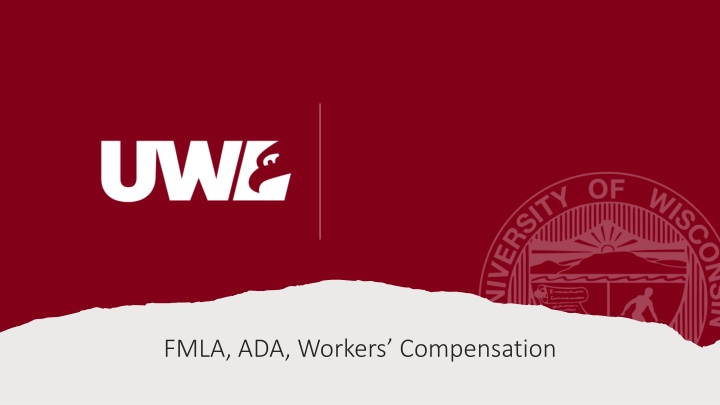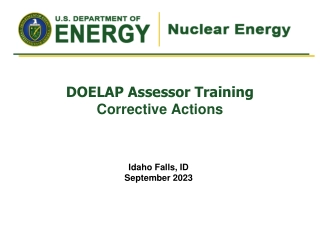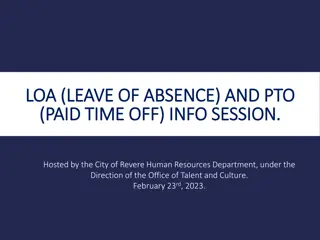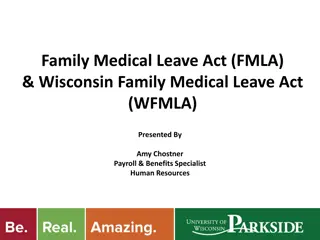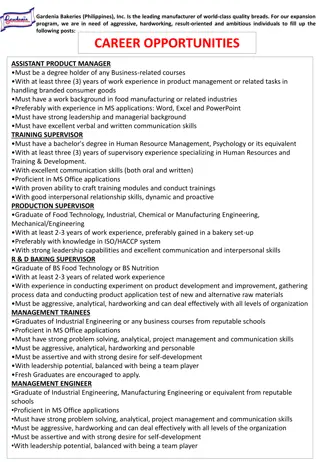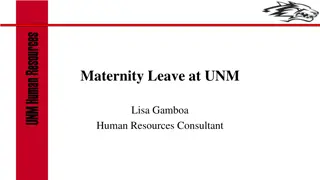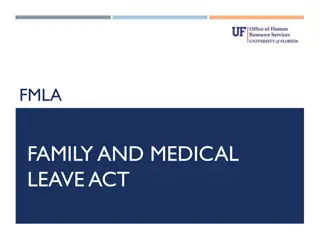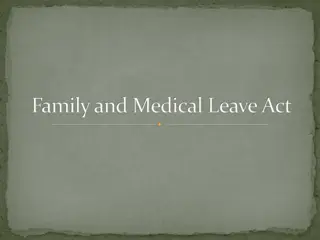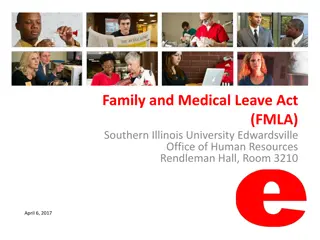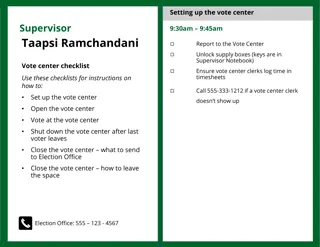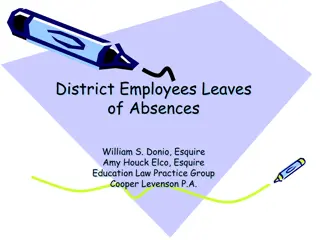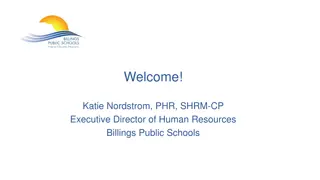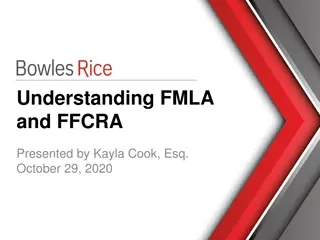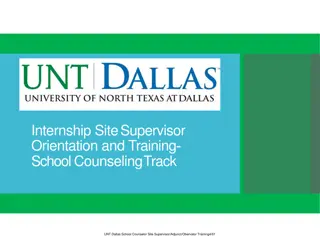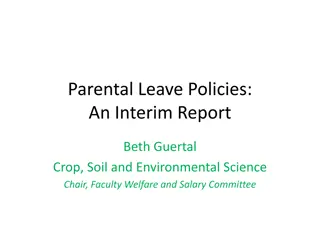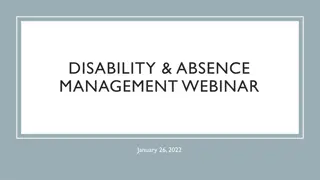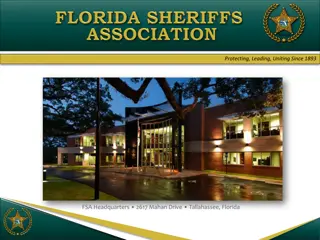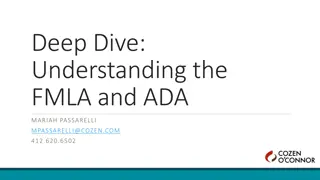Supervisor's FMLA Responsibilities and Actions
Discussing supervisors' responsibilities before, during, and after an employee's leave under the FMLA. Exploring FMLA eligibility, impact on employment, and procedures to follow for FMLA leaves.
Download Presentation

Please find below an Image/Link to download the presentation.
The content on the website is provided AS IS for your information and personal use only. It may not be sold, licensed, or shared on other websites without obtaining consent from the author.If you encounter any issues during the download, it is possible that the publisher has removed the file from their server.
You are allowed to download the files provided on this website for personal or commercial use, subject to the condition that they are used lawfully. All files are the property of their respective owners.
The content on the website is provided AS IS for your information and personal use only. It may not be sold, licensed, or shared on other websites without obtaining consent from the author.
E N D
Presentation Transcript
Discussing Supervisors FMLA responsibilities and actions to take before/during/after an employee s leave. FMLA What is FMLA? Who is eligible to take FMLA? Does FMLA impact my standing at UWL?
FMLA: Family Medical Leave Act The Family and Medical Leave Act of 1993 12 weeks (480 hours) of continuous or intermittent leave [within a calendar year] from work in order to focus on a serious health condition they or a qualified individual may be experiencing. FMLA protects employment and health benefits of eligible employees while away on a qualified leave. A qualifying reason to take FMLA includes a serious health condition for the employee; leave for caring for a spouse, child, or parent with a serious health condition; or for birth or adoption of a child.
Federal FMLA have worked for their employer for at least 12 months and have worked for at least 1,250 hours over the 12 months immediately prior to the leave. Eligibility Requirements State WFMLA (only 6 weeks of unpaid FMLA) eligibility requires that the employee have worked 1,000+ hours 12 months prior to leave request (Inclusive of Sick Leave hours).
Prior to Leave If the need for leave is foreseeable, the employee should apply for FMLA at least 30 days prior to the start date of the leave. Federal law requires that a Family and Medical Leave Request Forms be completed. Employee Request Document Medical Certification Leave of Absence (LOA) Document
During Leave Continuous Leave: When an employee is taking a block period of leave, they should not be working at any capacity. Intermittent Leave: As structured as possible, the employee should notify their supervisor as soon as possible for time needed off for the medical purpose. NOTE: Weekly submissions, with the note FMLA placed in the time submissions. MORE IMPORTANT NOTE: The submission of leave is the responsibility of the employee.
Employee will be returned to the same position held when the leave began or to an equivalent position with equivalent benefits, pay, and other terms and conditions of employment. Returning to Work Written documentation is required from the employee s healthcare provider stating fitness for duty and any restrictions upon return. The employee s return will be delayed until the required certification is provided to the Human Resources office and necessary accommodation can be made.
FMLA for Supervisors Your supervisory responsibilities with FMLA include: 1. Understanding and complying with FMLA federal/state laws and UW leave policies 2. Recognizing FMLA needs 3. Assessing and responding to employee leave requests 4. Planning for coverage of the employee s job duties while the employee is absent 5. Ensuring that the employee s FMLA usage in submitted in the UW Portal and is accurately recorded
1. Understanding and complying with FMLA, related state laws, and UW leave policies FMLA leaves are considered unpaid because the FMLA does not regulate pay during qualified leaves. If the employee has an available balance of time off benefits, they are able to use those benefits concurrent with their FMLA leave per UW policy. UW policy If they are choosing not to use sick leave/vacation/personal holiday hours: The employee is still responsible for employee portions of premium payments if choosing for benefits continue during FMLA. Should this be the case, UW System continues to pay their portion on all of your benefits during FMLA leaves (3-month duration) of absence. The federal Family and Medical Leave Act became effective for most employers on August 5, 1993. The Wisconsin Family and Medical Leave Act became effective on April 26, 1988. The Wisconsin Family and Medical Leave (WFMLA) Act provisions are set forth in Wis. Stat. 103.10 and Wis. Admin. Code DWD 225. The federal Family and Medical Leave (FMLA) Act provisions are set forth in 29 U.S.C. 2601, et seq. and 29 CFR Part 825
2. Recognizing when an employees absence may fall under FMLA Employees don t always know about or understand FMLA protection, so don t rely on them to request it by name. Sometimes you learn indirectly, such as through an extended absence or repeated requests for leave. DOL requires that you inform the employee of FMLA. Directing the employee to HR will ensure the employee receives the FMLA notice of their rights and responsibilities.
3. Assessing and responding to employee leave requests
4. Planning for coverage of the employees job duties while on FMLA Leave of Absence Document: required to be completed prior to approval of FMLA. Purpose of document is for there to be a written explanation for when the employee is needing to take off, a proposed plan for the department to function well in their absence, and a pre-determined return date.
5. Ensuring that the employees FMLA usage is submitted in the UW Portal and is accurately recorded
FMLA for Faculty A professor teaches class every Tuesday and Thursday. The professor has a scheduled surgery for Friday. Since this isn t a day they normally teach, do they need to enter any FMLA time off?
YES- they need to enter the time off for any time they are unavailable for that day FMLA for Faculty If surgery starts at 8AM that Friday morning, they are unavailable to field phone calls, emails, work on research, and participate in service activities. Therefore, 8 hours of Sick Leave should be entered.
ADA Accommodations Americans with Disabilities Act
Supervisors responsibilities when it comes to workplace disabilities and reasonable accommodations through collaboration with Human Resources, the department, and the employee. ADA Accommodations Who can request an accommodation? What if I can t accommodate to the employee s request? How long do accommodations last?
ADA: Americans with Disabilities Act Under the ADA, an "individual with a disability" is a person who has a physical or mental impairment that substantially limits one or more major life activities. The Americans With Disabilities Act (ADA) provides that no qualified individual with a disability be denied access to or participation in services, programs, and activities at UWL. This act applies to virtually all aspects of campus activities, including employment, student programming, and services provided to the community at large.
Reasonable Accommodations In accordance with ADA, the University will endeavor to make a reasonable accommodation to the physical or mental limitations of employees with disabilities unless the accommodation would impose an undue hardship on the operation of business. The term reasonable accommodation means a modification or adjustment to a job, the work environment, the job application process, or the way things are usually done that enables an individual with a disability to perform the essential functions of the job and to enjoy an equal employment opportunity.
ADA for Supervisors ADA Process 1. Employee may request ADA accommodation(s) through the HR office 2. Necessary medical support is acquired, and the request form specifically states the nature of the disability/limitation 3. HR reaches out the employee s Supervisor to explain the employee s request and determine if they are willing and able to accommodate 4. If unable to accommodate to the exact request, HR and the Supervisor work together to find a middle ground reasonable accommodation 5. Reasonable accommodation is presented to the employee through HR formal notice 6. ADA accommodation can begin and is reevaluated no less than every three months
ADA Scenario As a part of the regular work duties, an employee is tasked with drafting several emails, project notes, and spending hours of their day typing and sending out communications to the campus community. This individual loves their job; in fact, they ve been with the University for over 20 years. In the last year or so, this individual has struggled with keeping up on tasks, specifically sending out online communications on time. You notice in observation that this employee is spending less time on their computer and more time trying to communicate over the phone. You want to approach the individual about this observation and discuss the delayed communications, but you don t want to overstep. What should you do?
ADA Supervisor Checklist Instruct the employee to contact HR s ADA Specialist to learn more about their rights and responsibilities under the ADA It is then the responsibility of employee to initiate the ADA accommodation request process by completing the Accommodation Request Application Accommodation Request Application Do not ask about or get involved in the medical issues of the employee You should continue to monitor and record any performance issues and absences per policy and coordinate documentation with HR Contact HR if you have concerns about abuse of the ADA accommodation request process
ADA accommodations are highly individualized and should be viewed on a case-by-case basis. The employee s health condition, their role on campus, and their provider s instructions are weighed when determining a reasonable accommodation. ADA for Supervisors
Fluidity of ADA Accommodations ADA accommodations are modifiable where you, as a supervisor, can let HR know if the previously agreed upon reasonable accommodation is no longer working for the department. ADA accommodations are reevaluated by HR for modifications no less than every three months, but you can reach out to change it at any time. ADA accommodation paperwork is renewed every 7 years for compliance with federal laws and UW policy.
UWL will attempt to reassign that employee to a vacant position, which is equivalent in terms of pay and status, within the UW System. What if I cannot accommodate my employee? The employee must be qualified for the vacant position and the position must be vacant or will be vacant within a reasonable period of time.
Workers Compensation
Workers Compensation is a benefit program that pays for (if approved) medical treatment and wages lost due to work-related injuries or illnesses. Worker s Compensation Who should submit the injury? Why do I need to report about my employee s injury? What happens after the report is filed? Do I have to report a minor injury?
If a work-related injury or illness occurs: Is medical attention needed? Employee should seek reasonable and necessary medical care. Employee may review any medical information released to the employer. Employee is encouraged, if able, to explain that this is a work-related injury. Documentation Work Comp Process Employee must report the injury or illness to the supervisor (employer) as soon as possible Employee s Work Injury and Illness Report - All employee injury s should be reported within 24 hours of the injury Employer s First Report of Injury or Disease Supervisor s Accident Analysis and Prevention Report Authorization to Use or Disclose Health Information
What happens when a claim is filed? The completed injury report will start the worker s compensation claims process. The report is sent to UW System-Madison. The claim will be reviewed to determine if the injury was work related. If the claim is determined to be work related, UWL will begin coverage and payment for the costs. If the claim is denied, the employee will be notified. If there is disagreement about the denial decision, there are appeal rights. Information about claim denials is available on our system webpage.
What does Workers Compensation cover? Medical treatment resulting from a work-related injury or illness Lost wages To remain in full pay status, leave time is used. Work Comp placed in the comments section on leave submission. Sick leave Vacation leave Personal Holidays Leave is reinstated as WC hours are approved each pay period. Because employees are being paid from WC, they will not accrue as much sick leave or vacation leave. Compensation for permanent disabilities
Return to Work When employee returns Light Duty or with Restriction(s): Every reasonable effort is taken to help an injured worker safely return to pre-injury state, including employment, in the shortest time possible after an injury. Before an employee may return to work, the employee must present a medical providers written release to HR. HR will verify that the department can accommodate the restriction(s) an employee may have prior to his return. GOAL: Regular Duty
Thank you! If you have questions, please contact me at: 608-785-8629 or stop by my office at 144H Graff Main Hall
